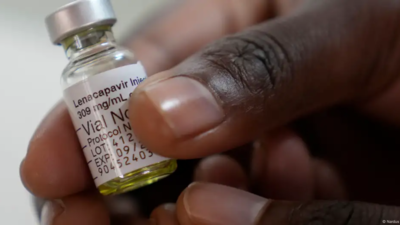
Representative image credits: Deutsche Welle
The battle against HIV has been dealt repeated blows in 2025 with cuts to funding for major global aid programs by the United States.There have also been budget cuts closer to home. And experts have told DW the cuts risk undermining efforts to end the HIV epidemic in the US by 2030, even now, with the approval of lenacapavir, what UNAIDS officials have described as a "miracle" drug, in HIV prevention.
Lencapavir provides six months of protection a
gainst HIV infection. The renowned journal Science named it 2024's scientific "breakthrough of the year."Some experts are asking whether the promise of the drug could be undone by the defunding of US public health agencies that are vital for getting lencapavir to those who need it most."Are we going to squander this, probably the greatest opportunity in 44 years of HIV prevention both in the US and globally?" asked Mitchell Warren, executive director of the nonpartisan HIV organisation AVAC, in an interview with DW.What makes lenacapavir a 'miracle' drug?Winnie Byanyima, executive director of UNAIDS, the United Nations agency that addresses HIV and AIDS around the world, dubbed lenacapavir a "miracle product" in 2024.If it was hype, it was well-founded hype. In late-stage clinical trials, lenacapavir had a near-perfect record of suppressing HIV infection.Having already approved it as a treatment to reduce viral load in patients with the disease, the US food and drug administration has now confirmed lenacapavir as a pre-exposure prophylaxis (PrEP) drug.
PrEP drugs are taken before having unprotected sex or injecting drugs to protect against HIV.Unlike other PrEP drugs, which aim to disrupt the virus at one stage of its lifecycle, lencapavir has been shown to attack HIV at several stages, increasing its effectiveness.About 400,000 US patients use some form of PrEP, usually a daily pill. But a twice-a-year injection with lenacapavir would provide people with the longest-lasting protection yet.'Knock on effects are huge'In his first term, US President Donald Trump started an "Ending the HIV Epidemic" (EHE) initiative, an effort to stop the transmission of the disease within the US by the end of this decade.But the current Trump administration's cost-cutting drive has downsized the federal health budget, affecting key public health agencies, such as the national institutes of health (NIH) and centers for disease control and prevention (CDC), and programs including medicare and medicaid.America's global aid initiatives, including USAID and PEPFAR (the President's emergency plan for AIDS relief), have also been substantially wound back."Whether it's the NIH research infrastructure [or] USAID for foreign assistance, these are big programs and none of them are HIV specific," Warren said. "But each one of them is diminished now in [its ability] to deliver the comprehensive and integrated programs that have been really at the forefront [of HIV response]."The result of this lost funding, Warren said, is that especially vulnerable groups, such as those from low-income backgrounds, gay and bisexual men and sex workers, may not benefit from the new PrEP drug, lenacapavir, which could provide them with unprecedented protection.Research has found that in US states which have expanded medicaid coverage to offer health services to "all people with household incomes below a certain level," a growing number of people are using PrEP.Jeffrey Crowley, director of the Center for HIV and Infectious Disease Policy at the O'Neill Institute, US, said services, like expanded medicaid coverage, have meant better access to HIV programs for those with the disease."This is an incredible accomplishment, and it's helped drive a lot of the progress we've seen," Crowley told DW.He also said the cuts will mean people lose access to HIV services, which other programs can't cover."I think the American people can be proud of how we responded to the HIV crisis domestically and globally, but this is all at risk. We've come so far, after so much death, why would we take a step backward?"

 8 hours ago
49
8 hours ago
49




























 English (US)
English (US)